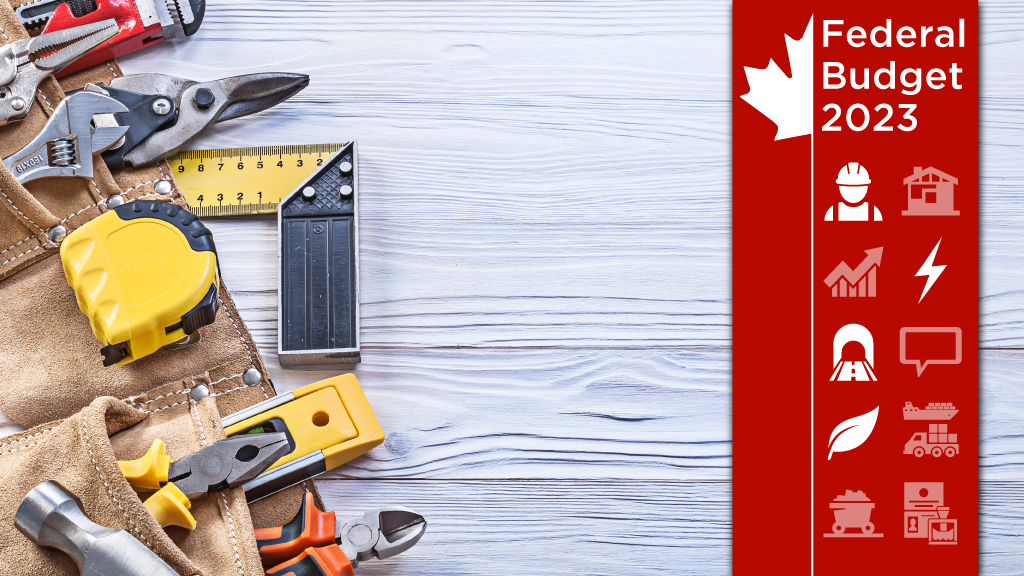The 2023 federal budget includes labour requirements and apprenticeship opportunities for clean electricity and clean technology projects.
Minister of Finance Chrystia Freeland delivered the federal budget, coined the Made-In-Canada Plan: Affordable Energy, Good Jobs, and a Growing Clean Economy, in the House of Commons on Parliament Hill in Ottawa on March 28.
Included in the document was the Clean Electricity Investment Tax Credit, which would be available as of the day of Budget 2024 for projects that did not begin construction before the day of Budget 2023. It contains labour requirements that include ensuring the wages paid are at the prevailing level and that apprenticeship training opportunities are being created in order to receive the full 15-per-cent tax credit.
“If labour requirements are not met, the credit rate will be reduced by 10 percentage points,” states the budget. “The labour requirements will come into effect on October 1, 2023. The government will consult with labour unions and other stakeholders to refine these labour requirements in the next few months.”
The budget also provided additional details on the labour requirements for the Clean Technology and Clean Hydrogen Investment Tax Credits. To be eligible for the highest tax credit rates, businesses must pay a total compensation package that equates to the prevailing wage.
“The definition of prevailing wage would be based on union compensation, including benefits and pension contributions from the most recent, widely applicable multi-employer collective bargaining agreement, or corresponding project labour agreements, in the jurisdiction within which relevant labour is employed,” the budget indicates. “Additionally, at least 10 per cent of the tradesperson hours worked must be performed by registered apprentices in the Red Seal trades. The government also intends to apply labour requirements related to the prevailing wage and hours worked by registered apprentices to the Investment Tax Credit for Carbon Capture, Utilization and Storage, and the Investment Tax Credit for Clean Electricity. The requirements would apply to labour that is performed on or after Oct. 1, 2023.”
In order to help tradespeople, the budget also proposes to double the maximum employment deduction for tool expenses from $500 to $1,000. This change would take effect for the 2023 taxation year and would reduce federal revenues by $11 million over six years, starting in 2022-23.
The federal government invests nearly $3 billion every year in Canada’s Labour Market Development Agreements and Workforce Development Agreements with provinces and territories which funds a range of supports, including skills training, onsite work experience, career counselling and job search assistance that helps one million Canadians each year to upgrade their skills or find new jobs. This year’s budget proposes to invest an additional $625 million in 2023-24 in the Labour Market Transfer Agreements.
The budget also reiterates support in response to labour shortages through immigration targets and mid-career training; preparing the workforce through skills development, including the Sectoral Workforce Solutions Program, Skills for Success, the Union Training and Innovation Program and the Apprenticeship Service; and supporting Canada’s students and youth through grants and loans programming.
In terms of labour mobility, in December 2022, the minister of intergovernmental affairs, infrastructure and communities launched a new Federal Action Plan to Strengthen Internal Trade to accelerate efforts to remove barriers to trade and labour mobility across Canada. The government plans to build on work it has undertaken in the past by providing $115 million over five years. This includes $30 million ongoing, through Budget 2022 to expand the Foreign Credential Recognition Program, which makes it easier for newcomer workers to have their credentials recognized in Canada and launching the Labour Mobility
Deduction for Tradespeople, which makes it more affordable for skilled tradespeople to travel to the worksite, wherever in Canada it is.
For immigration, Budget 2023 proposes to amend the Immigration and Refugee Protection Act to improve application intake in the Private Sponsorship of Refugees Program, resulting in shorter and more predictable processing times, helping sponsors to plan and prepare for the arrival of refugee families.











Recent Comments
comments for this post are closed